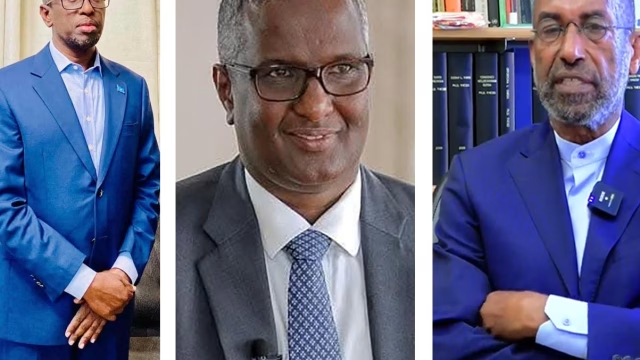More than 30 Kenya-based members of Somalia’s top militant group have accepted a police amnesty and…
 More than 30 Kenya-based members of Somalia’s top militant group have accepted a police amnesty and are providing information to help Kenyan police secure the country against threatened suicide attacks by the group, a Kenyan official said Saturday.
More than 30 Kenya-based members of Somalia’s top militant group have accepted a police amnesty and are providing information to help Kenyan police secure the country against threatened suicide attacks by the group, a Kenyan official said Saturday.
Police spokesman Eric Kiraithe said some of the men are Kenyan citizens. He said others are refugees from neighboring Somalia, where the al-Qaida-linked al-Shabab militant group is based.
“I can assure you a lot of young men from this country and also from Somalia are working with us now to secure this country and we believe that basically internally al-Shabab is loosing its foothold at a very fast rate,” Kiraithe said.
Kenyan troops last month moved into southern Somalia in pursuit of al-Shabab militants in response to a string of attacks and kidnappings in Kenya, including those of four European tourists. Al-Shabab threatened to retaliate with large-scale terror attacks in Nairobi, Kenya’s capital.
Police blame al-Shabab for recent attacks that have killed seven people in Kenya in the past few weeks.
Kenyan police commissioner Mathew Iteere extended amnesty to Kenyans recruited by al-Shabab following twin grenade attacks on the capital late last month. A non-Somali Kenyan was convicted to life in prison for one of the grenade attacks at a city bus stop, which killed one person.
Elgiva Bwire Oliacha, 28, was sentenced to life in prison after he pleaded guilty to several charges, including being a member of al-Shabab.
A July U.N. report warned that al-Shabab was recruiting non-Somali members from countries in East Africa and was giving a rise to a new generation of East African jihadists. The groups represent a new security challenge for the region and wider international community, the report said.
The report, by a panel of U.N. experts monitoring arms embargoes against Somalia and Eritrea, said that in the past al-Shabab’s presence in Kenya was concentrated primarily within the ethnic Somali community.
But since 2009 the group has rapidly expanded its influence and membership to non-Somali Kenyans who now make up the largest group of non-Somalis in al-Shabab.
Somalia has been a failed state for more than 20 years. The lawless country is a haven for pirates and international terrorists and the conflict is causing a major famine which is believed to have cost tens of thousands of lives already.
Kiraithe spoke at a joint press briefing with Kenya’s Department of Defense and Ministry of Foreign Affairs on the progress made in fighting the militants in Somalia and at home.
Lindsay Kiptiness, a Ministry of Foreign affairs official, said Kenya is seeking support for its military operation in Somalia from Arab nations including Iran and Turkey. He said the country will also seek support from the U.N. Security Council.
Kiptiness said Iran and Turkey have been supporting Somalia’s weak-U.N. backed government and Kenya expected those countries to support its effort to rid Somalia of al-Shabab, which is trying to topple the government.
He said the Kenya is conducting investigations on whether Eritrea supplied al-Shabab last week with three planeloads of weapons. Eritrea has denied supplying the group with weapons.
Kiptiness said Eritrea was being suspected because the report by the U.N. panel of experts monitoring arm embargoes on Eritrea and Somalia had reported previous deliveries in its July report.
“Further investigations will either pin them down or exonerate them,” Kiptiness said.
At the same time, Kenya’s military said that its charge to the al-Shabab stronghold of Kismayo in Somalia had slowed down as they tried to pacify al-Shabab holdouts in the territories they had captured, while also addressing the humanitarian needs of the populations in those areas.
Col. Cyrus Oguna said the militants changed tactics and were no longer in moving in large groups, which were easily targeted by Kenyan fighter planes, but are now operating in smaller groups of two to five people. Oguna said that militants were also using lighter weapons.
He said Kenyan military and Somali government forces killed 4 al-Shabab members on Friday.
Al-Shabab is blocking aid from reaching famine-stricken Somalis, after it banned major aid groups from operating in the territories it controls.
Oguna said there is a lot of suffering among the Somalis in the areas the Kenyan military has liberated and urged aid groups to start distributing relief.
Horseed Media
Source: AP


